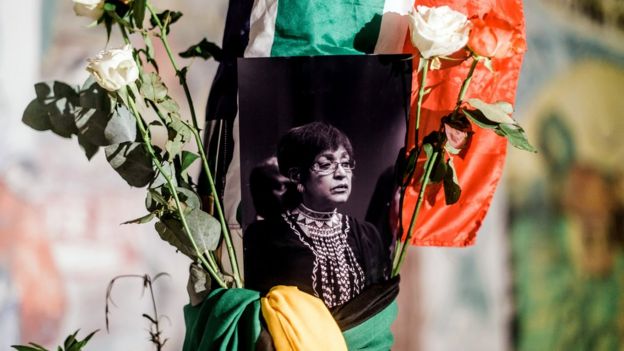Winnie Mandela in six quotes
4th April 2018

Winnie Madikizela-Mandela was a firebrand activist who fought the apartheid regime in South Africa. She was far more militant than South Africa's first black president, her ex-husband Nelson Mandela. She also became a critic of the African National Congress (ANC), the party to which she was fiercely loyal throughout her political life.
Here is a selection of some of her most compelling quotes.

On what prison did to her:

The quote, in the book Lives of Courage: Women for a New South Africa, highlights the extent to which Mrs Madikizela-Mandela was brutalised by the apartheid regime.
She was imprisoned on numerous occasions from 1969, much of it spent in solitary confinement. In 1976, the year of the Soweto riots, she was banished from the township to a remote rural area. At one stage her house was burned down.
Mrs Madikizela-Mandela was a politician in her own right, and opposed her husband's move to negotiate an end to apartheid, claiming it would lead to a "sell-out" of black people. Despite their differences, Mr Mandela appointed her as a deputy minister in his first government in 1994. He sacked her after a year, reinstated her when she successfully challenged his decision in court, and then sacked her again.

On how black people will achieve freedom:
The comment, at a rally in Johannesburg, signalled that Mrs Mandikizela-Mandela had endorsed the brutal method of "necklacing" - putting a tyre around suspected collaborators, dousing them with petrol, and burning them alive.
It caused shock around the world, and tainted the image of the ANC. The comment was condemned, including by South Africa's Nobel Peace laureate Archbishop Desmond Tutu (above).
On loving Nelson Mandela:
Nelson and Winnie Mandela were the most celebrated political couple in South Africa. Hailed as the "mother of the nation", she kept the name of her husband alive during his 27 in prison. She was a young social worker when she married Mr Mandela, then already a prominent ANC leader, in 1958. He was sentenced to life in prison in 1961 for his role in fighting apartheid.
On why she kept the Mandela name after their divorce:
The couple divorced in 1996, two years after Mr Mandela became South Africa's first black president. The years apart took its toll on their marriage, and Mrs Madikizela-Mandela was also accused of having an extra-marital affair. She kept his surname in what critics saw as an attempt to continue trading on the Mandela brand.
On women:
Mrs Madikizela-Mandela was hailed by her supporters as a feminist icon. She became the leader of the women's wing of the ANC in 1993, and believed that black women suffered from "a triple yoke of oppression" - their sex, colour and class.
On the ANC in government:
In the latter years of her life, Mrs Madikizela-Mandela became deeply disillusioned with the ANC - the former liberation movement which took power in 1994 - because of the corruption and in-fighting in its ranks. But she remained loyal to the party, and appeared to endorse Cyril Ramaphosa when he replaced the scandal-hit Jacob Zuma as president earlier this year.

